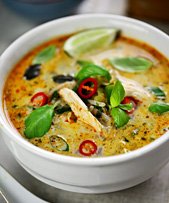Why we can’t let traditional Mediterranean and Asian diets die out

A while ago I shared a disturbing story with you from The New York Times about how the Mediterranean diet is dying out in its homeland and being replaced by a modern Western diet. Here’s part of the story:
Dr. Michalis Stagourakis has seen a transformation of his pediatric practice here over the past three years. The usual sniffles and stomachaches of childhood are now interspersed with far more serious conditions: diabetes, high blood pressure, high cholesterol. A changing diet, he says, has produced an epidemic of obesity and related maladies.
Small towns like this one in western Crete, considered the birthplace of the famously healthful Mediterranean diet — emphasizing olive oil, fresh produce and fish — are now overflowing with chocolate shops, pizza places, ice cream parlors, soda machines and fast-food joints.
The fact is that the Mediterranean diet, which has been associated with longer life spans and lower rates of heart disease and cancer, is in retreat in its home region. Today it is more likely to be found in the upscale restaurants of London and New York than among the young generation in places like Greece, where two-thirds of children are now overweight and the health effects are mounting, health officials say.
“This is a place where you’d see people who lived to 100, where people were all fit and trim,” Dr. Stagourakis said. “Now you see kids whose longevity is less than their parents’. That’s really scaring people.”
“This is a place where you’d see people who lived to 100, where people were all fit and trim,” Dr. Stagourakis said. “Now you see kids whose longevity is less than their parents’. That’s really scaring people.”
That concern has been echoed by the Food and Agriculture Organization of the United Nations, which said in a report this summer that the region’s diet had “decayed into a moribund state.”
I’ve also talked before about how a modern Western diet has well and truly infiltrated many Asian countries as well. In fact, Japan now has well over 3000 McDonalds restaurants (which is second only to the U.S.). Not surprisingly, obesity rates as well as rates of heart disease, type 2 diabetes, and cancer have increased substantially there in recent years.
However, there have been attempts to turn the tide, and health authorities in many Mediterranean and Asian countries have been enthusiastically urging their citizens to return to their traditional diets. Late last year, UNESCO even deemed the traditional Mediterranean diet so important that it granted it protected status as a “Cultural Heritage.”
And it’s not just Mediterranean and Asian countries urging their citizens to adopt these traditional eating practices. The latest Dietary Guidelines for Americans now include several paragraphs recommending the Mediterranean diet, and also a section that points out the health benefits of the Japanese diet.
On top of this, study after study continues to show the wide range of health benefits that can be achieved by eating traditional Mediterranean and Asian diets.
Yet nothing seems to be working. Traditional Mediterranean and Asian eating practices continue to die out in their homelands, and very few of us are adopting these eating practices ourselves (although many of us are quick to embrace the latest fad diet).
At this rate, traditional Mediterranean and Asian diets could eventually be relegated to the history books — and what an absolute shame that would be.
But there is a simple way you can help keep these culinary traditions alive — embrace them yourself. For example, why not have a stir-fry or a risotto for dinner, slowly savor it, and wash it down with a wine or cold beer. Sounds like a tough job doesn’t it?
Also, stock up your kitchen with traditional Mediterranean and Asian ingredients and regularly cook Mediterranean and Asian meals. (Make our recipes, search the Web for recipes, or get out Mediterranean and Asian cookbooks from the library.) You could even have a dinner party featuring traditional Mediterranean and/or Asian dishes, and let your guests know that these foods aren’t only highly delicious, they’re also highly nutritious. Who knows, maybe they’ll get hooked too.
Of course these are all small steps in the overall picture. But the more of us who get involved, the more chance there is of keeping these wonderful and healthful culinary traditions alive well into the future!







